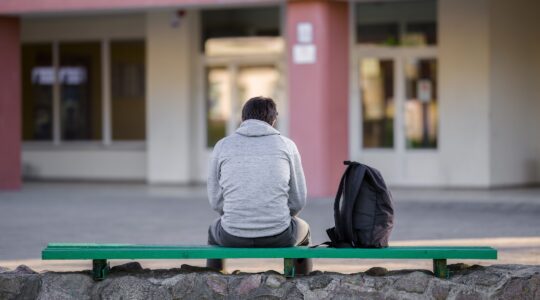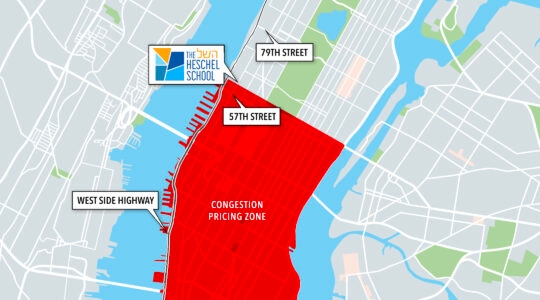It was hardly the lineup for an evening of emotion: two British lords and a gaggle of politicians. But there was lots of strong sentiment at the London dinner to mark 100 years since the Balfour Declaration — especially as both the sender and recipient of the Declaration were represented by their heirs.
On Nov. 2, 1917, Britain’s Foreign Secretary Arthur Balfour sent a letter to Lord Rothschild saying that his government favored the “establishment in Palestine of a national home for the Jewish people.” On Nov. 2, 2017, the current Lord Rothschild hosted the current Lord Balfour and the prime minister of this Jewish “national home” for a gala dinner.
Just two days earlier, another historic occasion was revisited. Horses charged to within a few feet of where I was standing in the Israeli city of Beersheba, during a re-enactment of the battle that meant that Britain’s Balfour promise would actually be relevant.
Before the Battle of Beersheba, British forces failed their World War I efforts to wrestle control of Palestine from the Ottomans, pounding away at the enemy but to no avail. Two days before the Balfour Declaration, Australian and New Zealand troops beat the Ottomans in a surprise cavalry charge there. It was a turning point of the war, and meant that Britain would control Palestine and the Balfour promise would come to fruition.
And so, just as the lords in London paid tribute to the achievements of their namesakes, in Beersheba descendants of the Aussie and Kiwi soldiers, and other history enthusiasts, took to a dusty patch and recreated the battle. They carried three flags — their own flags, and that of Israel, which the Battle of Beersheba helped to create.
At the Balfour anniversary in London, the British government affirmed that it is proud of its role in paving the way to Israel, disappointing Palestinian leaders who had called upon it to apologize. Theresa May, the British prime minister, said in her speech at the dinner that “when some people suggest we should apologize for this letter, I say absolutely not.”
With these few words, an occasion that could have easily become an embarrassing nightmare for Israel, turned out perfectly. While it was never likely that Britain would apologize for the Balfour letter, it was possible that the London establishment would burst the Jewish community’s bubble, and react coolly to the anniversary.
In the run-up to the occasion, it seemed possible that the Labour leader Jeremy Corbyn, who is famously unenthusiastic about Israel, could have won the June election and been leading Britain. And there are mixed feelings about the Declaration in the British Foreign Office, where some diplomats would rather have played down the anniversary.
But in the end, the Conservative leader May won the election, and decided to give the anniversary a full embrace — while Corbyn stayed away from the anniversary dinner. May called the Declaration “a letter which gave birth to a most extraordinary country.”
The Balfour centenary turned out to be an anniversary that had the ability to move all sorts of people. At a Knesset conference to mark the anniversary on Tuesday, Likud politician Yoav Kisch spoke about his grandfather Frederick Kisch, the highest-ranking Jew ever to serve in the British Army, who was well connected to political powers in London at the time of the Declaration. The centenary also moved the historian Simon Schama, who linked the past, present and hope for the future in a special lecture, during which he was overcome with emotion. He spoke of Jewish-Arab coexistence projects in contemporary Israel, and said that the history of 100 years ago boosts hope that they will have an impact.
Schama said: “To speak of such things as fragile shoots of tikva, hope, can and will, I know be written off as naive piety, as high-minded fantasy, but then again the dark pages of Jewish history have been lit by such impossibilities and one of them, the one we are happily remembering this evening, happened in 1917, a germ of life, a great hope for the future planted amid the hecatombs of the dead.”
In Beersheba, the main event, attended by Israeli and Australian prime minister and New Zealand’s governor general, was in a war cemetery. This highlighted the sacrifice that went into ending 400 years of Ottoman rule in Palestine. Thousands of Australians visited for the occasion, brimming with pride for their country’s achievement. For the Jews who made the journey, it was also a celebration of Israeli-Australian ties, and how their identity as Australians and Jewish people who embrace Israel go together without conflict.
And just as Schama found a message of hope in London, there was a message of hope in Beersheba. There, at the British cemetery, there were representatives of Britain’s First World War enemies. As I stood there at the end of the poignant ceremony, these representatives filed past me, walking between graves of soldiers that their armies killed, to lay wreaths. There’s no escaping history in a military cemetery, but seeing that there, enemies of past conflicts can come together, is a much-needed symbol of hope in a troubled region.
Nathan Jeffay’s column appears twice a month. Follow him on Facebook via @nathanonisrael.
The New York Jewish Week brings you the stories behind the headlines, keeping you connected to Jewish life in New York. Help sustain the reporting you trust by donating today.




